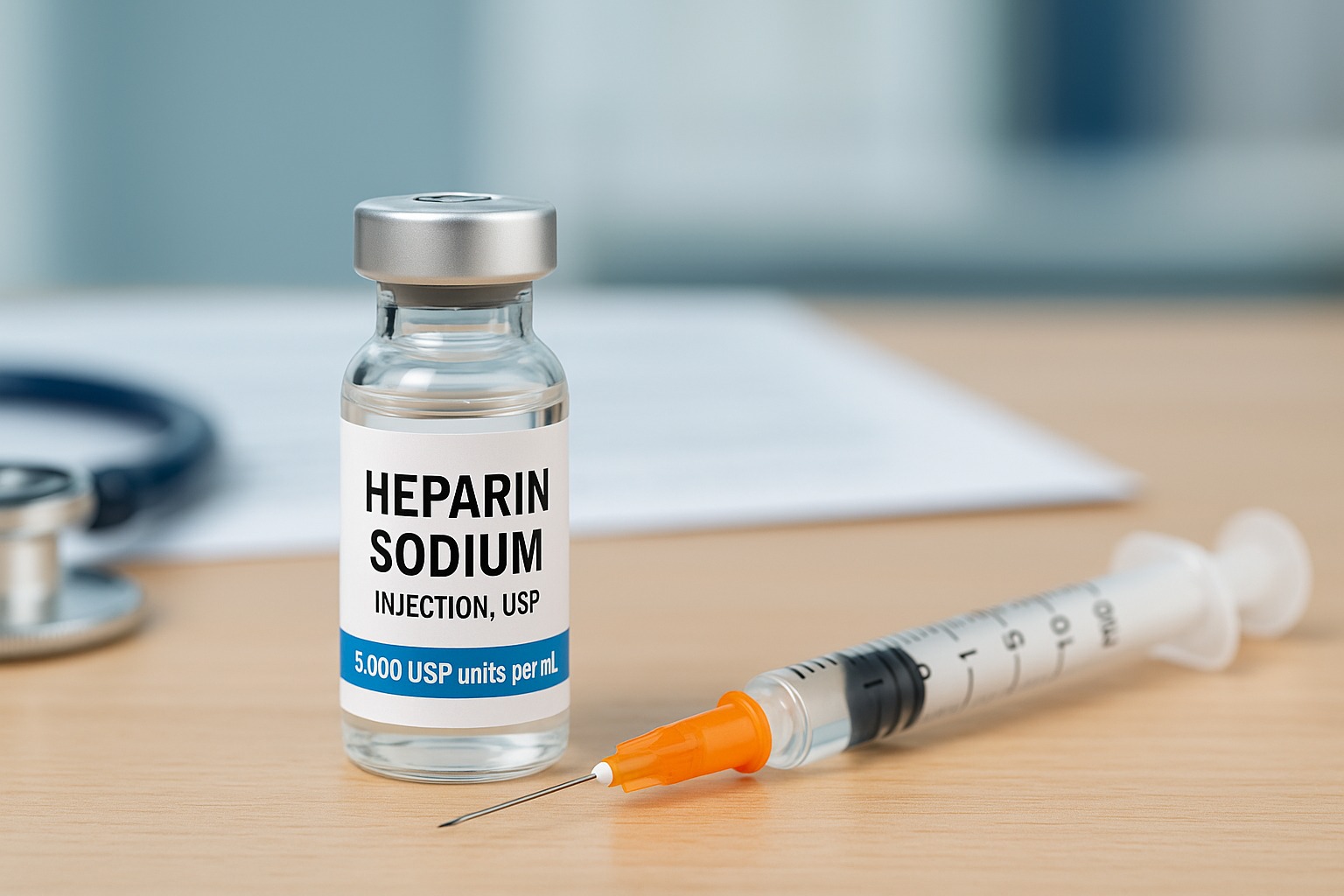Heparin sodium is a prescription anticoagulant (blood thinner) used to prevent and treat blood clots. It belongs to a class of medications called anticoagulants that help keep the blood flowing smoothly and reduce the risk of dangerous clot formation. Doctors usually prescribe heparin sodium in hospitals, either through injection or intravenous (IV) infusion, especially in patients at risk of deep vein thrombosis (DVT), pulmonary embolism (PE), or clot-related complications during surgery and dialysis.
In this clear, patient-friendly guide, you’ll learn what heparin sodium is, how it works, when doctors prescribe it, how it’s given, possible side effects, safety tips, and answers to some of the most common questions people search online.
Quick disclaimer: This article is for educational purposes only and is not a substitute for professional medical advice. Always follow your healthcare provider’s instructions.
What Is Heparin Sodium?
Heparin sodium is the sodium salt form of heparin, a naturally occurring substance in the body that helps prevent blood clotting. As a medication, it is made available in different forms, usually as an injection or IV solution used in hospitals.
Heparin sodium is not taken by mouth. Instead, it is given under the skin (subcutaneous) or directly into a vein (IV) by healthcare professionals.
It comes in different strengths depending on medical needs:
- Heparin sodium injection (various unit strengths)
- Heparin sodium IV solution (for continuous infusion in hospitals)
How Does Heparin Sodium Work?
Blood clots form when proteins in your blood, called clotting factors, create a mesh to stop bleeding. While this is useful after an injury, unwanted clots inside blood vessels can cause serious health issues like stroke, heart attack, or pulmonary embolism.
Heparin sodium works by:
- Binding to antithrombin III, a natural protein that inactivates clotting factors (especially thrombin and factor Xa).
- Slowing down the clotting process and preventing new clots from forming.
- Helping the body break down existing clots more effectively.
Because heparin sodium acts quickly, it is often used in emergency or hospital settings.
Common Uses of Heparin Sodium
Doctors prescribe heparin sodium for several conditions, including:
- Deep Vein Thrombosis (DVT): Preventing blood clots in the legs, especially after surgery or during hospitalization.
- Pulmonary Embolism (PE): Treating clots that travel to the lungs.
- Heart and vascular procedures: Such as open-heart surgery, dialysis, and certain diagnostic tests.
- Atrial fibrillation: To lower the risk of stroke from clot formation.
- Central venous or arterial lines: To keep catheters open and prevent clotting.
Dosage and Administration
Heparin sodium must always be given under medical supervision. The exact dose depends on your condition, body weight, and medical history.
- Injection (subcutaneous): Given under the skin in the abdomen or thigh, usually every 8–12 hours.
- IV infusion: Continuous dosing in a hospital, closely monitored with blood tests (like aPTT).
- Line flushes: Small doses used to keep IV catheters from clogging.
Important reminders:
- Never self-inject unless your doctor has taught you the proper technique.
- Doses vary widely, so follow only your healthcare provider’s prescription.
- Blood tests (such as aPTT or anti-Xa levels) are often required to ensure safe dosing.
Possible Side Effects of Heparin Sodium
Like all medications, heparin sodium may cause side effects. Not everyone experiences them, but knowing the signs is important.
Common side effects:
- Bruising or pain at the injection site
- Minor bleeding (like nosebleeds or gum bleeding)
Serious side effects (call your doctor right away):
- Unusual or heavy bleeding (in urine, stool, or coughing up blood)
- Severe headache, dizziness, or sudden vision changes
- Chest pain or shortness of breath
- Severe bruising or skin changes at the injection site
A rare but serious reaction is Heparin-Induced Thrombocytopenia (HIT), where the immune system reacts against heparin, lowering platelet counts and increasing clot risks. This requires immediate medical attention.
Warnings and Precautions
Before using heparin sodium, tell your doctor if you have:
- A history of bleeding disorders
- Stomach ulcers or intestinal bleeding
- High blood pressure
- Recent surgery, especially brain, eye, or spinal surgery
- Liver or kidney disease
- A history of heparin-induced thrombocytopenia (HIT)
Pregnancy and breastfeeding: Heparin sodium is sometimes used during pregnancy when anticoagulation is needed, but always under close medical supervision.
Drug interactions: Certain medications, including aspirin, NSAIDs, and other blood thinners, may increase bleeding risk when used with heparin sodium. Always tell your healthcare provider about all medications and supplements you take.
FAQs About Heparin Sodium
Q1. How fast does heparin sodium work?
Heparin acts almost immediately when given by IV and within 20–60 minutes when injected under the skin.
Q2. Can I take heparin sodium at home?
It is usually given in hospitals, but some patients may self-inject at home under strict medical guidance.
Q3. Is heparin sodium the same as low molecular weight heparin (LMWH)?
No. LMWH (like enoxaparin) has more predictable dosing and is often given at home. Heparin sodium is generally used in hospitals where close monitoring is available.
Q4. What should I avoid while on heparin sodium?
Avoid activities with a high risk of injury, and do not take additional blood thinners unless approved by your doctor.
Final Thoughts
Heparin sodium is a life-saving anticoagulant that plays a critical role in preventing and treating blood clots. It works quickly and is often the first choice in hospitals for patients at risk of clot-related complications. While highly effective, it must be used carefully under medical supervision due to the risk of bleeding and rare complications like HIT.
Always follow your doctor’s instructions, attend regular monitoring if prescribed, and report any unusual bleeding or health changes right away.
When used safely, heparin sodium can protect you from serious clot-related conditions and improve overall treatment outcomes.


Leave a Comment